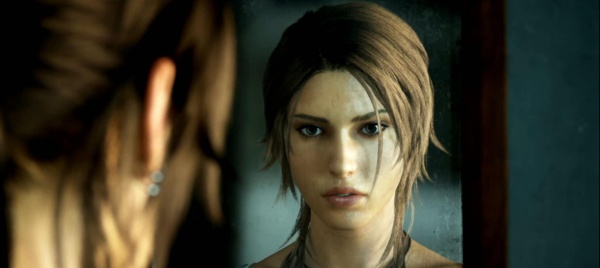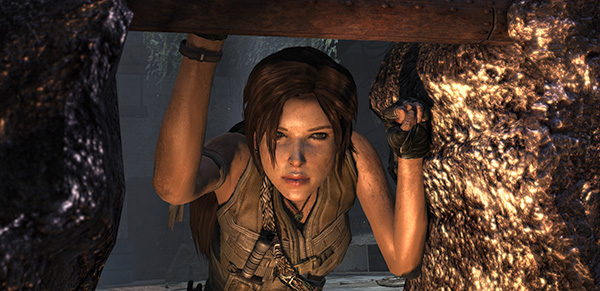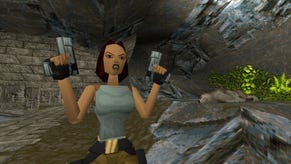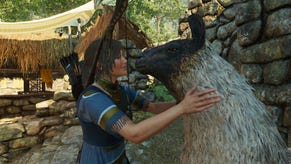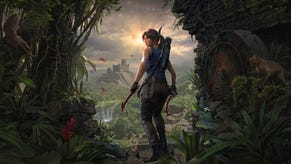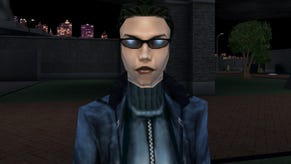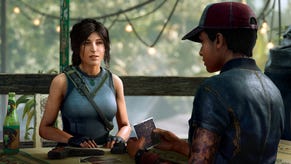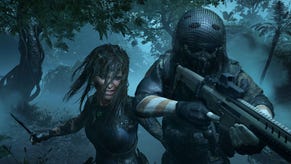Rhianna Pratchett's #1ReasonToBe
#1Rhison
Recently, we had the wonderful fortune to post GDC's magnificent #1ReasonToBe panel in full. It's a powerfully eye-opening thing - regardless of which "side" of the equality "debate" you fall on - and you should absolutely, definitely give it a watch if you haven't already. One person, however, was missing from its lineup: industry writing vet Rhianna Pratchett, who - in addition to whipping up words for the likes of Tomb Raider, Overlord, Mirror's Edge, and heaps more - sorta, you know, created the #1ReasonToBe hashtag in the first place. She wasn't able to make it out due to scheduling conflicts, but this is why they invented the Internet: so we could do anything from anywhere at any time. Thus, we bring you Pratchett's #1Reason - not to mention her viewpoints on why equality's very different from 'pinking' games, why the industry's failing to attract female talent, what controversies surrounding Tomb Raider taught her, and how we can ultimately make games better for everyone.
RPS: First up, you sadly weren't able to attend the #1ReasonToBe panel at GDC. So, in that style, what is your one reason? What have been your defining moments working in games - both in terms of negativity - ala Brenda Romero's experiences at E3 - and the event(s) that made you say, "You know what? I'm willing to fight this uphill battle because I love what I do"?
Pratchett: Although I’ve not personally experienced some of the more extreme examples of industry sexism which the first hashtag highlighted, #1reasonwhy and #1reasontobe have lit a fire in me - and Pratchetts are inherently a bit fighty by nature. As I mentioned above, I’ve really realized in the last year how much being a visible industry female matters to people. Not necessarily as much to myself, or to other female developers already in the industry, but those who are um-ing and err-ing at the side-lines. Hesitant to make the jump, or even try to.
Over the last couple of months I’ve done several talks in girls’ schools about working in games and have helped introduce them to game design and narrative, through initiatives like Little Miss Geek. They light up. Like they’ve just stepped through the wardrobe and discovered Narnia. It heart-warming, even for someone who’s not yet managed to graduate beyond cat ownership. I’ve gained so much from this industry and this feels, at least in part, like a way of giving back.
RPS: You started #1ReasonToBe as a more positive complement to #1ReasonWhy. Are we sometimes in danger, do you think, of losing sight of the fact that the gaming industry's a really special, interesting thing? In doing so, do we risk frightening away talented people who might be interested in making games?
Pratchett: If we’re ever going to change the gender balance of this industry - which I think is the main thing that’s really going to help the situation - then we need to emphasize the positives, as well as being honest about the negatives. The problems highlighted by #1reasonwhy were shocking, saddening and predictable in equal measure. It doesn’t matter how ‘special’ your industry is, there’s no excuse for some of the sheer asshattery which that hashtag revealed. However, maintaining a sense of perspective is vital. Yes, it’s important to talk about the fight, but it’s just as important to remember what we’re fighting for.
The main reason why I started #1reasontobe is because I believe that raising awareness of what a great industry this can be, and what opportunities there are for men and women alike, is fundamental in tackling these problems. When I first started out as a games writer, I knew so little about the role (because people just weren’t talking about it in the same way they do now) that it took a while to realize what the career I’d side-stepped into actually was.
RPS: The fight against sexism is mired in negativity – in many cases with good reason, seeing as sexism is a horrible thing – but is that in some ways detrimental? For instance, it often creates an oppositional relationship against those who don't think sexism and equality aren't viable issues. We get angry and – in some cases – even hate them instead of trying to calmly educate them into considering other people's feelings. So is the problem of attitude here bigger than most people think?
Pratchett: #1reasonwhy evolved into something that was about more than just sexism, but the problems and issues women encounter in this industry linked to their gender. Some of the tweets certainly constituted experience of abuse and harassment, whilst other issues were more along the lines of ignorance and stubborn behaviour - traits that both genders share. There was a lot to get angry about.
It’s often difficult to separate signal from noise online. We all know that anonymous abuse is rife, and rarely are people ever held accountable for their actions. Most trolls (male or female) are not interested in being educated, they just want to rage. It’s hard to know what the solution is for that, beyond tougher anonymity restrictions and penalties for online abuse.
As I mentioned earlier, the best weapon against sexism in the games is to get more skilled women into the industry, keep them there and generally level the playing field.
RPS: Your work on Tomb Raider's been well-publicized, as has – fairly recently – the fact that the majority of Dragon Age III's writing team is female. In both cases, the benefits have gotten the spotlight: Lara's evolution into a real character instead of a caricature, DA III's removal of problematic story arcs, etc. Do you think we need more of that? More people saying, “Yes, being inclusive and understanding has made our game measurably better/more interesting”?
Pratchett: For many years I steered clear of ‘women in games’ issues. In fact, I’ll admit to being downright uncomfortable with being asked about that side of things. Mainly because I felt that the best thing I could do for women in games was just be one and do my job to the best of my ability. I didn’t have a choice about my gender. I do have a choice about my career - therefore it’s always felt more meaningful to me.
However, now I’ve got many more titles under my belt I’ve felt more at ease with talking about that side of things – hence my contribution to both hashtags. Mainly because I’ve realised that for young girls getting into the industry, it does matter to see women out there talking about these issues - although I’d still always prefer to talk about the work.
After all, no one ever asks a male writer about writing a male character, or how his maleness gave him special insights, which shows that we still have a long way to go in both the fields of narrative and gender balance.
The controversy surrounding Tomb Raider shone a light on my gender in a way that was never intended. Ultimately, no one should be pushed into the spotlight in this industry simply because of their gender, but because they’ve done meaningful, interesting work that’s worth talking about. It’s the work that counts, not what the person has between their legs.
RPS: In working on Tomb Raider – a series that's gone from gaming industry sex symbol to symbol of the industry's gradual maturation – what sorts of challenges have you come up against on this front?
Pratchett: The whole controversy surrounding Lara’s first kill scene, and the reasons why it was included in the game, was tough to deal with. And obviously, Lara’s gender played a big part in that. The whole thing was also unexpected, as it wouldn’t have been a controversy in any other entertainment field. Partly that was due to the fact that I’d not been announced back then, so I couldn’t just say: “Actually it’s not like that, it’s like this.” Alongside that, many assumptions were based on limited information because so few people had actually played that scene in context at the time.
I can talk all I want about the fact that, although we thought about that scene carefully and treated it with honesty and integrity, it was not meant to be a single transformative event. That it’s actually about Lara’s reactions - and her reactions to her reactions. Or that the narrative team didn’t put it in to make players want to ‘protect’ Lara. But the unfortunate reality is that some people’s perception will always be coloured by the first thing they heard.
During the uproar there seemed to be one particular undercurrent of assuming that the scene was put together by men who clearly didn’t understand how to deal with the evolution of a female character - especially a videogame character. I felt that it did male creators a disservice. When I was announced some of those rumours quietened. In all honesty I felt that my gender shouldn’t have been a big deal in this matter – the fact that I helped create it and therefore could speak about it from that standpoint, should have been the only thing that counted.
However, the whole issue has brought up some really interesting and important debates about what’s acceptable for videogames to depict, where the boundaries are and how we speak about female characters and their relationship to players.
RPS: One of the biggest #1ReasonWhy tweets is your own – specifically, the one about having to ask teams to consider that the player could be female. Why is that such an easy oversight for so many people, though? I mean, we're talking about half of the entire human population here. Even from a “pragmatic” standpoint, that means they're leaving half the world's money on the table. Why do people remain ignorant of that?
Pratchett: The industry is used to targeting the male demographic, at least when it comes to triple-A, non-casual titles. And it is still, in many ways, stuck in that rut, either uncertain of how to change, not interested in changing or simply averse to straying from the established path.
In the movie industry they talk about the desire for ‘four-quadrant movies’ – namely those that appeal to men and women, both over 25 and under 25. Those kinds of movies - such as Avatar, Titanic, The Hunger Games, Indiana Jones, Jurassic Park, etc - really clean-up at the box office. They do it through strong story, characters, exciting action and thrilling set-pieces. That’s the kind of thing we need to look at more closely and find a way to emulate, not through whole-sale copying, but in a way that really works for our industry and players.
It’s not about the ‘pinking’ of games. It’s about making them better for everyone.
RPS: Sexism is everywhere in society - Western or otherwise - which has led to an odd response to movements like #1ReasonWhy: “Well, this is hardly confined to the gaming industry.” It's a pretty defeatist way of viewing things, though. Do you think the key here is to focus efforts (in this case, on gaming) instead of taking a divide-and-conquer approach and being overwhelmed by the sheer magnitude of, well, changing the world all at once?
Pratchett: As you say, sexism exists in the industry, because sexism exists in the world. When you have any industry that’s skewed in one gender direction or another, then sexism is an unfortunate by-product. Men don’t always get an easy ride in the field of nursing, for example.
Changing the world is a tall order, changing our world, or at least reshaping it a little, seems doable. By and large most male developers I’ve met and worked with would actively welcome more women into the industry, providing they had the necessary skills to do the job they’re hired for.
It’s tough - although not impossible - to change an asshole, but my gut feeling is that, by and large, it isn’t necessarily male attitudes which keeping women out of games development or cause them to burnout. Instead, it’s a combination of a poor work-life balancing conditions, a lack of awareness of the opportunities out there and dwindling creative diversity. And these are problems that have a huge impact on the industry as a whole.
Yes, this industry’s in need of a shake-up, but one that should be designed to benefit all developers, males and females alike. We need to place stronger emphasis on improving working conditions, burnout rate and industry awareness. Ultimately, that’s what will improve the quality of the games and the lives of those who create them. And that’s what really matters.
RPS: It's been quite some time since the #1Reason hashtags took Twitter by storm. Are you happy with how they've evolved, how they've become almost a rallying cry when sexist or otherwise alienating issues wriggle out from the woodwork?
They’ve given women - and some guys - a place where they can voice their woes and embrace their joys, and they know they’re not just shouting into the darkness. It’s also produced interesting (and disturbing) articles like Alanah Pearce’s 30 days of Sexism. But I also think it’s been valuable for encouraging more real-world initiatives which revolve around actually trying to change things, rather than just talking about them. Words are great, but it’s action that really matters.
RPS: Do you think progress has been steady and more visible since #1Reason caught on? I mean, on one hand, there was the IGDA GDC party and the recent Dragon's Crown controversy, among others, but pushback was immediate and severe. Do you think, if nothing else, people are starting to understand that we can't just ignore the issue of equality and hope it'll go away?
Pratchett: Certainly people seem quicker to call out the most ridiculous examples of sexism, objectifications for the male gaze, or even just poor party planning. Obviously everyone’s rage mileage will vary on those, but it is important that we highlight and talk about them. Companies need to witness the sales and customers they’re losing out on before they’ll actually start changing anything.



